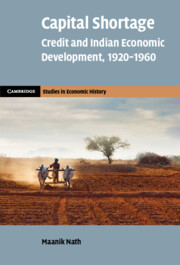Book contents
- Capital Shortage
- Cambridge Studies in Economic History
- Capital Shortage
- Copyright page
- Contents
- Figures
- Tables
- Acknowledgments
- 1 Introduction
- 2 Agriculture, Commerce and Governance in the Longue Durée
- 3 Climate and Credit
- 4 Courts and Credit
- 5 Regulating Moneylenders
- 6 Regulating Cooperatives
- 7 Credit after 1960
- 8 Conclusion
- Epilogue
- Bibliography
- Index
3 - Climate and Credit
Published online by Cambridge University Press: 08 September 2023
- Capital Shortage
- Cambridge Studies in Economic History
- Capital Shortage
- Copyright page
- Contents
- Figures
- Tables
- Acknowledgments
- 1 Introduction
- 2 Agriculture, Commerce and Governance in the Longue Durée
- 3 Climate and Credit
- 4 Courts and Credit
- 5 Regulating Moneylenders
- 6 Regulating Cooperatives
- 7 Credit after 1960
- 8 Conclusion
- Epilogue
- Bibliography
- Index
Summary
Summary: The rural credit market in Madras remained unregulated until the mid-1930s. Drawing from credit reports in the 1920s and early 1930s, this chapter explores regional lending patterns. The chapter analyses variation in the challenges faced by South Indian farmers across major ecological zones. Peasants in the arid parts of Madras had few options to protect against seasonal volatility and drought. Rice farmers in the river deltas were better able to manage climatic risks. The chances of borrowers defaulting on loans followed these patterns, being higher in the dry than the wet districts. Credit was provided seasonally, in four- to six-month intervals, and creditors provided wider access to loans in the irrigated areas. Moneylenders selectively chose clients in dry zones, often excluding smallholders and tenants. Variation in credit access had implications for investment rates and development outcomes across districts. These findings suggest important connections between climatic risk, credit supply and inequality in colonial India.
Keywords
- Type
- Chapter
- Information
- Capital ShortageCredit and Indian Economic Development, 1920–1960, pp. 38 - 71Publisher: Cambridge University PressPrint publication year: 2023



